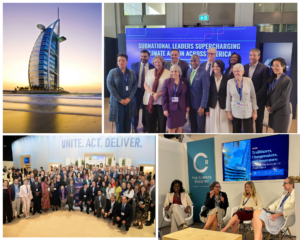April 25, 2024 – Today, the Environmental Protection Agency (EPA) adopted a final rule that sets limits on carbon emissions from existing coal-fired and new gas-fired power plants. These standards will reduce carbon pollution and other harmful pollutants, which will help to protect public health and address the disproportionate impact of pollution on historically underserved communities.
The EPA’s final rule will help the United States achieve its goal of reducing national carbon emissions by 50-52% by 2030. As the second largest source of carbon dioxide pollution nationally, limiting emissions from the electric power generation sector is critical to address climate change and reach our national targets. The new standards for power plants will reduce harmful pollution such as nitrogen oxide (NOx), sulfur dioxide (SO2), and particulate matter (PM2.5), while strengthening the Mercury and Air Toxics Standards (MATS) for coal-fired power plants and reducing hazardous air pollutant (HAP) emissions. This will not only address climate impacts but will improve public health, avoiding more than 360,000 cases of asthma symptoms in 2035 alone.
Local governments and their community partners have been leading the effort to set ambitious emissions reduction targets and address the existence of harmful pollutants. In 2023, Climate Mayors and C40 Cities called on the EPA to adopt ambitious standards. Cities such as Madison, Los Angeles, Minneapolis, and Cleveland have created climate action plans to control carbon emissions and transition to cleaner energy solutions. Our members are also committed to addressing the disproportionate impact of carbon pollution and pollutants on historically underserved and overburdened communities. The EPA’s latest emissions limits will help cities achieve their climate goals and ensure cleaner air for all communities.
“Today’s rule from the EPA is a much-needed measure to tackle air pollution in our communities and improve the health and safety of our residents,” said Kate Wright, Climate Mayors’ Executive Director. “With stronger pollution limits, our country will shift away from dangerous fossil fuels to clean energy solutions that are better for our economy and health. We welcome the EPA’s rules, which will undoubtedly strengthen the existing efforts of mayors and local leaders to create cleaner, healthier, and more thriving cities across the U.S. Climate Mayors remains committed to working with the EPA to continue reducing planet-warming emissions while addressing the impacts of air pollution on our communities.”
“Too often, lower income and communities of color bear the brunt of pollution, and suffer the most devastating impacts of extreme weather exacerbated by carbon emissions,” said Kate Johnson, Head of US Federal Affairs for C40 Cities. “The EPA’s final rule on power plant emissions is a major step forward in our shared work to improve the health, safety, and quality of life for millions of Americans.. Along with leading mayors across the country, C40 Cities looks forward to building on this rule to ensure clean air for all.”

